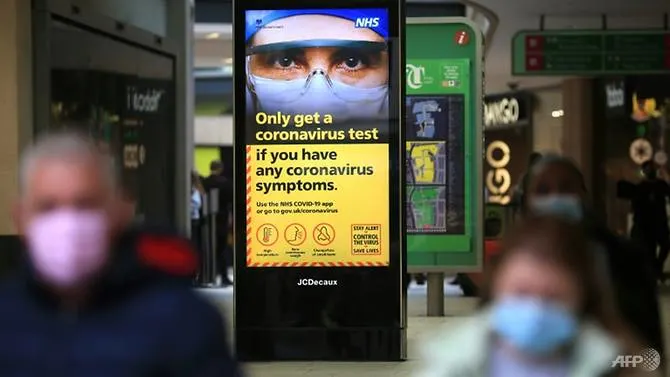Millions more face English virus restrictions as cases spiral
31 October, 2020

Millions more persons in northern England face stricter coronavirus rules in a few days, officials said on Friday (Oct 30), as reports suggested the federal government is considering a nationwide lockdown.
From Monday, practically 2.4 million residents in five districts of West Yorkshire, including in the location of Leeds, will be barred from socialising with other households indoors.
Pubs and bars not serving "substantial meals" must close, alongside casinos and betting shops, while people are also told to avoid unnecessary travel.
The Department of Health said the measures were needed as infection rates in West Yorkshire were among the highest in the united states and rising rapidly.
THE CHANGING TIMES reported on Friday that Prime Minister Boris Johnson was considering a go back to a national lockdown to battle the surge.
Johnson was likely to hold a press conference on Monday to announce new restrictions, which would close everything except "essential shops", schools and universities, the paper said, quoting a government source.
In its weekly study of COVID-19 prevalence, any office for National Statistics (ONS) said the quantity of folks with the virus had risen to around one in 100 nationwide.
"There's been growth in all age ranges over the past fourteen days; older teenagers and adults continue to have the best current rates while rates seem to be steeply increasing among secondary school children," it said.
The country's official science advisory panel warned in a report published on Friday that the virus was spreading "significantly" faster and that hospitalisations were rising at an increased rate through England than its predicted "worst-case" scenario used in July.
The report said that in mid-October, shortly before new local rules were introduced, around four times as many persons were catching COVID-19 than anticipated in the July report.
That study warned that 85,000 more people could die during the winter wave.
West Yorkshire's imminent restrictions will be the latest step in the united kingdom government's localised response to the surging transmission, which has come under increasing scrutiny in recent weeks.
A lot more than 11 million persons - in regards to a fifth of England's population - will be under the tightest measures from next week.
The majority of the areas in the "very high" group of the government's three-tier COVID-19 alert system are in northern and central places.
Nottingham became the most recent city to enter the best tier on Friday.
On Thursday night, young persons took to the streets in fancy dress and drank in large groups before a ban on alcohol sales in shops arrived to force at 2100 GMT.
"TARGETED"
The pandemic has hit Britain harder than any other country in Europe, with more than 45,000 persons having died within 28 days of testing positive.
Case rates are spiralling again after a lull, tracking the problem elsewhere on the continent.
England is seeing practically 52,000 new cases daily, a 47 per cent weekly rise, in line with the ONS, which conducts its analysis of households by using several universities and health bodies, and excludes persons in hospitals and care homes.
Britain's European neighbours and the devolved governments in Scotland, Wales and Northern Ireland have reimposed partial lockdowns to try to cut infection rates.
Foreign Secretary Dominic Raab said on Friday the government would continue its "targeted and focused" strategy of local restrictions in virus hotspots.
"The arbitrariness of a blanket approach will be far worse compared to the effects of trying to be as targeted as possible," he said.
Meanwhile, a fresh study reported on Friday a COVID-19 variant originating in Spanish farm personnel has spread rapidly throughout Europe in recent months and now accounts for most cases in Britain.
The variant - called 20A.EU1 - is considered to have already been spread from northeastern Spain by persons returning from holidays there, according to the study, which is awaiting peer review in a medical journal.
There happens to be no evidence that any risk of strain spreads faster or impacts illness severity and immunity.
Source: www.channelnewsasia.com
TAG(s):
